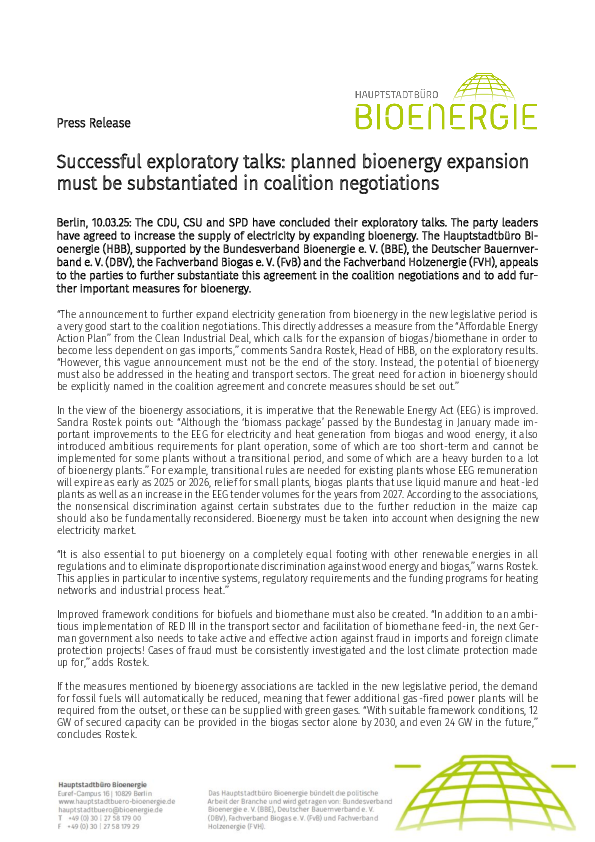“The announcement to further expand electricity generation from bioenergy in the new legislative period is a very good start to the coalition negotiations. This directly addresses a measure from the “Affordable Energy Action Plan” from the Clean Industrial Deal, which calls for the expansion of biogas/biomethane in order to become less dependent on gas imports,” comments Sandra Rostek, Head of HBB, on the exploratory results. “However, this vague announcement must not be the end of the story. Instead, the potential of bioenergy must also be addressed in the heating and transport sectors. The great need for action in bioenergy should be explicitly named in the coalition agreement and concrete measures should be set out.”
In the view of the bioenergy associations, it is imperative that the Renewable Energy Act (EEG) is improved. Sandra Rostek points out: “Although the ‘biomass package’ passed by the Bundestag in January made important improvements to the EEG for electricity and heat generation from biogas and wood energy, it also introduced ambitious requirements for plant operation, some of which are too short-term and cannot be implemented for some plants without a transitional period, and some of which are a heavy burden to a lot of bioenergy plants.” For example, transitional rules are needed for existing plants whose EEG remuneration will expire as early as 2025 or 2026, relief for small plants, biogas plants that use liquid manure and heat-led plants as well as an increase in the EEG tender volumes for the years from 2027. According to the associations, the nonsensical discrimination against certain substrates due to the further reduction in the maize cap should also be fundamentally reconsidered. Bioenergy must be taken into account when designing the new electricity market.
“It is also essential to put bioenergy on a completely equal footing with other renewable energies in all regulations and to eliminate disproportionate discrimination against wood energy and biogas,” warns Rostek. This applies in particular to incentive systems, regulatory requirements and the funding programs for heating networks and industrial process heat.”
Improved framework conditions for biofuels and biomethane must also be created. “In addition to an ambitious implementation of RED III in the transport sector and facilitation of biomethane feed-in, the next German government also needs to take active and effective action against fraud in imports and foreign climate protection projects! Cases of fraud must be consistently investigated and the lost climate protection made up for,” adds Rostek.
If the measures mentioned by bioenergy associations are tackled in the new legislative period, the demand for fossil fuels will automatically be reduced, meaning that fewer additional gas-fired power plants will be required from the outset, or these can be supplied with green gases. “With suitable framework conditions, 12 GW of secured capacity can be provided in the biogas sector alone by 2030, and even 24 GW in the future,” concludes Rostek.
The 10 most important recommendations of the bioenergy sector for the coalition negotiations can be found on the HBB website under the following link.
About the bioenergy associations
Four associations pool their expertise and resources in the field of energy policy in the "Main Bureau Bioenergy": the German Bioenergy Association (BBE), the German Farmers' Association (DBV), the German Biogas Association (FvB) and the German Wood Energy Association (FVH). Together they represent the entire bioenergy sector, from farmers and foresters, plant and machinery manufacturers, energy suppliers to operators and planners. The Bioenergy Capital Office gives the many different players and various technologies in the bioenergy industry a strong common voice in the political arena. Particularly in the electricity and heat sectors, it advocates the energy policy interests of its supporting associations across all technologies. In its contacts with political decision-makers, the Capital City Bioenergy Office can draw on a broad network of supporters and cooperates in particular with the German Renewable Energy Federation (BEE)

